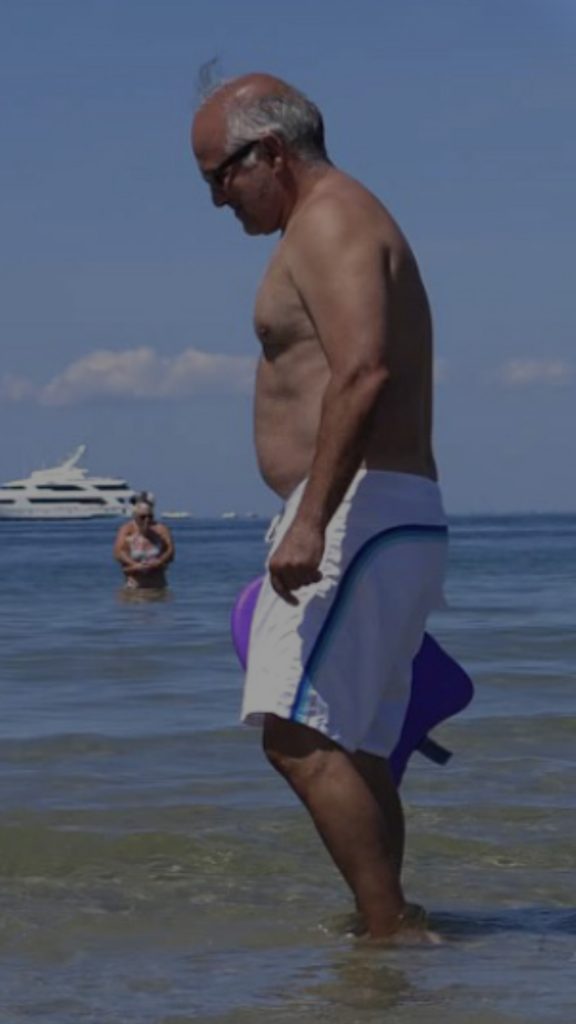


I’m not only the BCOH Director, I’m also a patient.
- Carmine L. Morreale, D.M.D., M.A.G.D., Diplomate ABDSM
DMD
MAGD
Diplomate ABDSM
More About My Journey...
When does it hit you? When they finally demand you sleep
on the couch because you have ruined another good night’s
sleep with your snoring?
When another annual physical with your doctor ends with a
demand by them for you to deal with your elevated blood
pressure? Is it when you finally see a photo of yourself,
in living color – at the party honoring the birth of your
grandchild (Figure 1)? Or perhaps it may even take a
pandemic!
Watch | Like | Subscribe
My Own Sleep Apnea Challenge
Our world has changed in unimaginable ways: mandatory face mask use, quarantining, curfews, greeting friends and family with nods and air hugs, and saying goodbye to people with the phrase, “Be safe!”
You re reading because you finally realize that you need help with sleep, whether it is for your spouse/partner, your family, or yourself. We have the ways to help, but first, let me share a secret. I used to snore. Not just your heavy breathing type snoring. I’m talking about rattle-the-dishes, hear-it-through-the-walls, dog-running-away kind of snoring. As my father would say, “to beat the band,” kind of snoring. But now each night before I go to bed, I do one thing different. Let me explain.
For over 35 years, we at Boston Center for Oral Health (SleepFacts), have helped people prevent dental disease and improve the health and appearance of smiles. In the last several years, we have developed and implemented the expertise that allows us not only to prevent dental disease, but prevent and reverse systemic disease with our dental sleep medicine program. Helping people reach their optimal health by getting restful, restorative sleep is the foundation to overall wellness.
When most people think of sleep apnea, they think of heavy, older men – usually bald too. Even medical doctors tend to only consider sending heavier, older
men for sleep studies, even though younger, thinner people may present with similar symptoms. In this book, we will describe the basics of sleep, many of the
Figure 2x important things that sleep impacts, how to get a good night’s sleep, and what happens if we don’t. Our brain sometimes has to make a decision between what’s good in the long term and what’s necessary immediately.
Breathing MUST be maintained, or there will be no more “long term”. So why am I, as a dentist, involved in this field?
Because we’ve learned that such clenching and grinding can not only lead to damaging the teeth and any “restorations” (like crowns, bridges, and dental
implants, etc.), but it can also contribute to TMJ problems, facial pain and headaches.
Because we’ve learned that even periodontal disease, or “gum disease” seems to be worse in people with sleep apnea.
And because we as dentists have a simple and easy to use therapy that is effective for most people with sleep disordered breathing issues, called “oral appliance
therapy.”
Oral appliance therapy, in a nutshell, involves wearing a small, custom made device on the teeth that keeps the lower jaw from falling back and obstructing the airway. I wear one every night! I started the process to spare my wife from my horrible snoring. Now I wear it because I cannot tolerate sleeping without it!
If you’ve ever taken a CPR course you probably remember “head tilt, chin lift.” This procedure is performed to help open the airway on the unconscious xi
person so that when air is blown into them it actually goes into their lungs.
Several of the main muscles of the tongue attach to the lower jaw, just on the inside of the chin. Bringing the lower jaw forward has a tendency to open the airway.
You can experience this yourself. Make a snoring noise in the back of your throat (plug your nose to make sure it’s in your throat and not in your nose). Now thrust
your lower jaw forward and see if changes how hard it is to make the noise. For most people, it will be harder to make the noise. This is because the airway is now
more open.
The problem is, you can’t just hold your jaw forward all night by yourself.
As you’ll learn in my eBook, in dream sleep our muscles become “more floppy,” sort of paralyzed, and this makes it even easier for the airway to become even smaller or collapse. Sleeping on our backs also makes it easier for the airway to become restricted.

CPAP, or continuous positive airway pressure, is an excellent treatment for sleep apnea in which the patient wears a mask attached to a machine that blows air to keep their airway open in all dimensions. For those who can tolerate its use, it’s fantastic and can absolutely change their life. As dentists we always encourage our patients to stay on their CPAP if they can use it, and we prefer for patients with more severe sleep apnea to at least try CPAP
Meditation
Sleep Therapy
Weight Loss
Good Nutrition
Inch Loss Program
Strength Gaining
My Patient's Success Stories!

"I want to specifically speak to my new oral sleeping device. It is absolutely fantastic and a true game changer".
Edward Mancuso
Initially, I reached out to BCOH to replace a sleep apnea device. Immediately after speaking with Dr. Morreale, I felt confident that BCOH would be able to help me. The device that was made for me has been helpful in eliminating the symptoms mild sleep apnea for which I had been diagnosed and is more comfortable than I imagined! Shortly afterwards, I broke a tooth and needed a crown that would not only solve that problem but also fit perfectly with my new sleep apnea mandibular device so the new device was not compromised. In asking Dr. Morreale to resolve the fit of a new crown with my device, my concerns about fit and compromise were listened to and resolved AND the crown - a process that had in the past taken over 3 weeks to complete, was done in one sitting. Perfect fits all around! The BCOH is a great practice - professional, compassionate, and great results.

George Weaver
"Dr. Morrealle has been well ahead of the pack in identifying cutting edge technology for the benefit of his patients like me and I wouldn't trust my own care to anyone but him!"
I am happy to update the original review of my sleep apnea appliance provided to me by Dr. Morreale 4 years ago. While I noticed an immediate improvement in my overall energy and sense of well being the first night I used it, I am pleased to report that the benefits continue even to this day and I could not sleep one night without my appliance. My body clock remains very normal and energy level is high. Never a need for an afternoon nap! Even more, an annual echocardiogram has been completely stable over this time period, underscoring my belief that sound sleep has a significant positive impact on heart function even as we age. Dr. Morrealle has been well ahead of the pack in identifying cutting edge technology for the benefit of his patients like me and I wouldn't trust my own care to anyone but him!
